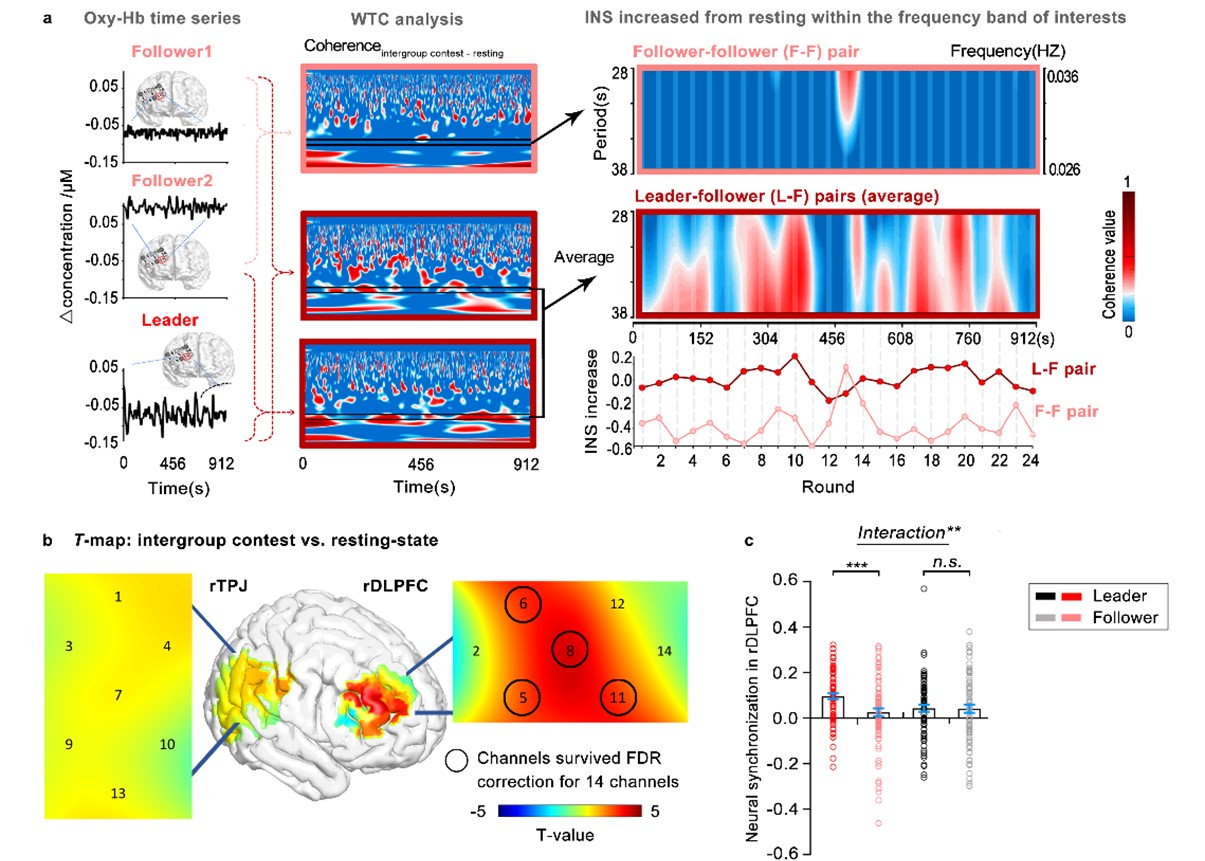Nature Human Behaviour 2023年12月刊,发表了北京师范大学认知神经科学与学习国家重点实验室,IDG/McGovern脑科学研究院马燚娜课题组的研究成果“Leader–follower behavioural coordination and neural synchronization during intergroup conflict”。
作为群居性社会动物,人类进化出一系列适应于群居生活的独特认知、情感过程以及大脑功能(Ma & Tan, 2023, Neuron)。虽然社会群体为人类个体撑起“保护伞”,促进不同规模的人际和群内合作(Yang et al., 2020, Nat Neurosci; Li et al., 2022, J Neurosci),但不同社会群体的存在也不可避免地带来群体间的偏见,刻板印象,甚至群际冲突。纵观人类历史,群际竞争多由群体领导者发起,群体成员追随领导者一起协同地进攻或防御。然而,群体成员为何会跟从领导者的指令、在群际竞争中与领导者保持协同一致?马燚娜课题组结合功能性近红外光谱成像的多人脑神经活动同步记录技术来回答这一问题,揭示了群际竞争中,处于劣势方促进领导者领导力、领导者与跟从者协同,从而促进群体内部合作的脑神经同步机制。
研究采用群际竞争决策范式,并同时记录6名参与者的背外侧前额叶皮层(DLPFC)、颞顶联合(TPJ)的神经活动。研究发现,相比于跟从者,群体领导者更有牺牲精神,对群体贡献更多。尤其处于防守地位(相比进攻地位)时,领导者的贡献更大程度影响群体的胜负。来自神经结果发现,处于防守地位时,群体领导者背外侧前额叶的神经活动增强,且活动强度可以预测领导者对群体冲突的贡献。处于防守地位促进领导者-追随者的脑神经同步性(图1),且与领导者在背外侧神经前额叶神经活动的同步性可以预测追随者对领导者行为的回应程度。然而,处于进攻性位置时,领导者和追随者在行为和神经活动上的协同性都较差,这一发现在一定程度上解释了群体攻击外敌经常失败的原因。

图1 领导者-追随者的神经同步性在防御外敌时更强
该研究得到国家自然科学基金项目、科技创新2030-“脑科学与类脑研究”重大项目青年科学家项目,中央高校基本科研业务费专项资金资助,北京师范大学认知神经科学与学习国家重点实验室,IDG/McGovern脑科学研究院科研启动经费等资助。马燚娜课题组学生张荷婧为第一作者,马燚娜教授为独立通讯作者。马燚娜课题学生杨佳欣、倪军,莱顿大学Carsten De Dreu教授也对此研究做出重要贡献。
论文链接:Zhang, H., Yang, J., Ni, J., De Dreu, C. K., & Ma, Y. (2023). Leader–follower behavioural coordination and neural synchronization during intergroup conflict. Nature Human Behaviour, 7, 2169–2181.
https://www.nature.com/articles/s41562-023-01663-0
课题组链接:https://mylab.bnu.edu.cn/
课题组前期相关论文:
Ma, Y.*, Tan, H. (2023). Representation of intergroup conflict in the human brain. Neuron, 111, 1692-1696.
Li, S., Ma, S., Wang, D., Zhang, H., ... Ma, Y.* (2022). Oxytocin and the punitive hub—dynamic spread of cooperation in human social networks. J Neurosci, 42, 5930-5943.
Yang, J., Zhang, H., Ni, J., De Dreu, C., Ma, Y.* (2020). Within-group synchronization in the prefrontal cortex associates with intergroup conflict. Nat Neurosci, 23, 754-760
Zhang, H., Gross, J., De Dreu, C., Ma, Y.* (2019). Oxytocin promotes coordinated out-group attack during intergroup conflict in humans. eLife, 8, e40698.
Ma, Y., Liu, Y., Rand, D. G., Heatherton, T. F., Han, S. (2015). Opposing oxytocin effects on inter-group cooperative behavior in intuitive and reflective minds. Neuropsychopharmacology, 40: 2379-2387.